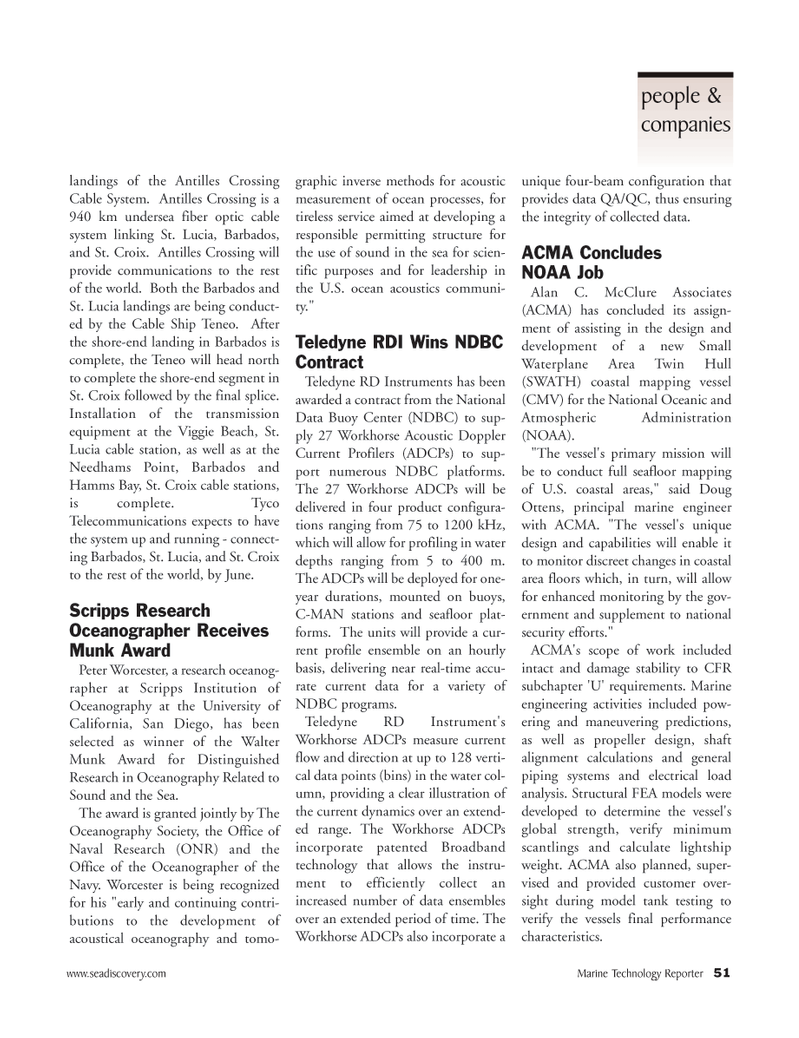
Page 51: of Marine Technology Magazine (April 2006)
The Offshore Technology Edition
Read this page in Pdf, Flash or Html5 edition of April 2006 Marine Technology Magazine
www.seadiscovery.com Marine Technology Reporter 51 landings of the Antilles Crossing
Cable System. Antilles Crossing is a 940 km undersea fiber optic cable system linking St. Lucia, Barbados, and St. Croix. Antilles Crossing will provide communications to the rest of the world. Both the Barbados and
St. Lucia landings are being conduct- ed by the Cable Ship Teneo. After the shore-end landing in Barbados is complete, the Teneo will head north to complete the shore-end segment in
St. Croix followed by the final splice.
Installation of the transmission equipment at the Viggie Beach, St.
Lucia cable station, as well as at the
Needhams Point, Barbados and
Hamms Bay, St. Croix cable stations, is complete. Tyco
Telecommunications expects to have the system up and running - connect- ing Barbados, St. Lucia, and St. Croix to the rest of the world, by June.
Scripps Research
Oceanographer Receives
Munk Award
Peter Worcester, a research oceanog- rapher at Scripps Institution of
Oceanography at the University of
California, San Diego, has been selected as winner of the Walter
Munk Award for Distinguished
Research in Oceanography Related to
Sound and the Sea.
The award is granted jointly by The
Oceanography Society, the Office of
Naval Research (ONR) and the
Office of the Oceanographer of the
Navy. Worcester is being recognized for his "early and continuing contri- butions to the development of acoustical oceanography and tomo- graphic inverse methods for acoustic measurement of ocean processes, for tireless service aimed at developing a responsible permitting structure for the use of sound in the sea for scien- tific purposes and for leadership in the U.S. ocean acoustics communi- ty."
Teledyne RDI Wins NDBC
Contract
Teledyne RD Instruments has been awarded a contract from the National
Data Buoy Center (NDBC) to sup- ply 27 Workhorse Acoustic Doppler
Current Profilers (ADCPs) to sup- port numerous NDBC platforms.
The 27 Workhorse ADCPs will be delivered in four product configura- tions ranging from 75 to 1200 kHz, which will allow for profiling in water depths ranging from 5 to 400 m.
The ADCPs will be deployed for one- year durations, mounted on buoys,
C-MAN stations and seafloor plat- forms. The units will provide a cur- rent profile ensemble on an hourly basis, delivering near real-time accu- rate current data for a variety of
NDBC programs.
Teledyne RD Instrument's
Workhorse ADCPs measure current flow and direction at up to 128 verti- cal data points (bins) in the water col- umn, providing a clear illustration of the current dynamics over an extend- ed range. The Workhorse ADCPs incorporate patented Broadband technology that allows the instru- ment to efficiently collect an increased number of data ensembles over an extended period of time. The
Workhorse ADCPs also incorporate a unique four-beam configuration that provides data QA/QC, thus ensuring the integrity of collected data.
ACMA Concludes
NOAA Job
Alan C. McClure Associates (ACMA) has concluded its assign- ment of assisting in the design and development of a new Small
Waterplane Area Twin Hull (SWATH) coastal mapping vessel (CMV) for the National Oceanic and
Atmospheric Administration (NOAA). "The vessel's primary mission will be to conduct full seafloor mapping of U.S. coastal areas," said Doug
Ottens, principal marine engineer with ACMA. "The vessel's unique design and capabilities will enable it to monitor discreet changes in coastal area floors which, in turn, will allow for enhanced monitoring by the gov- ernment and supplement to national security efforts."
ACMA's scope of work included intact and damage stability to CFR subchapter 'U' requirements. Marine engineering activities included pow- ering and maneuvering predictions, as well as propeller design, shaft alignment calculations and general piping systems and electrical load analysis. Structural FEA models were developed to determine the vessel's global strength, verify minimum scantlings and calculate lightship weight. ACMA also planned, super- vised and provided customer over- sight during model tank testing to verify the vessels final performance characteristics. people & companies
MTR#3 (49-64).qxd 4/7/2006 11:32 AM Page 51

 50
50

 52
52
